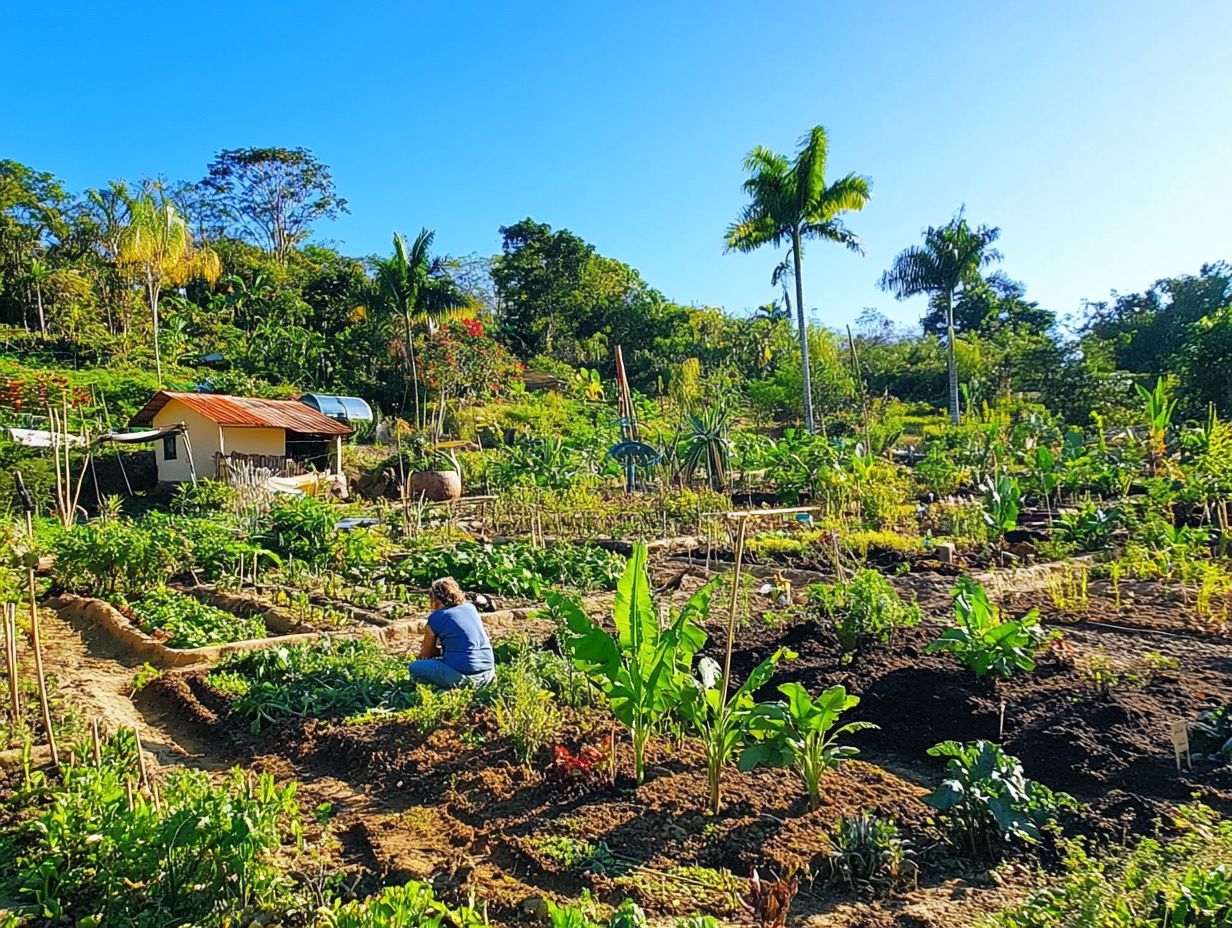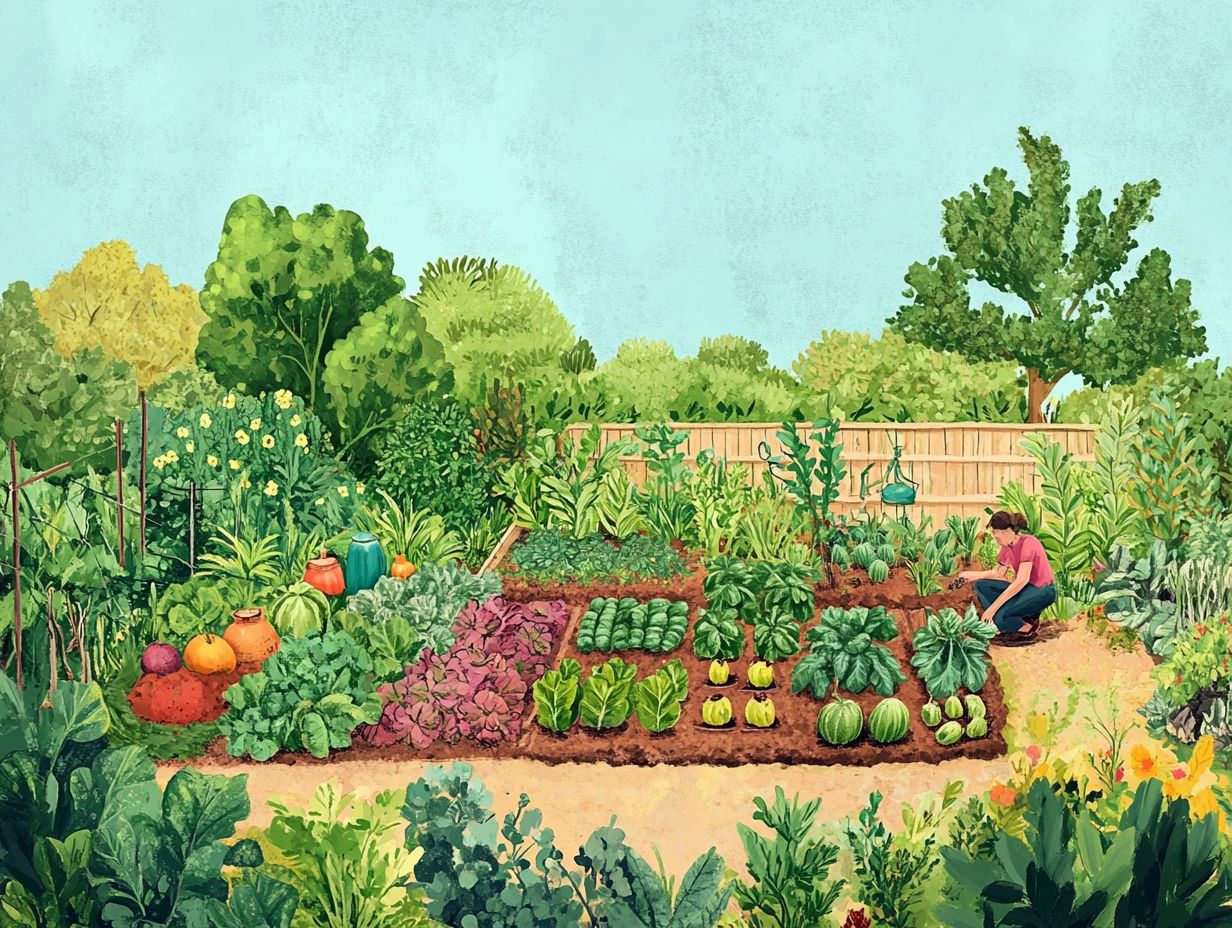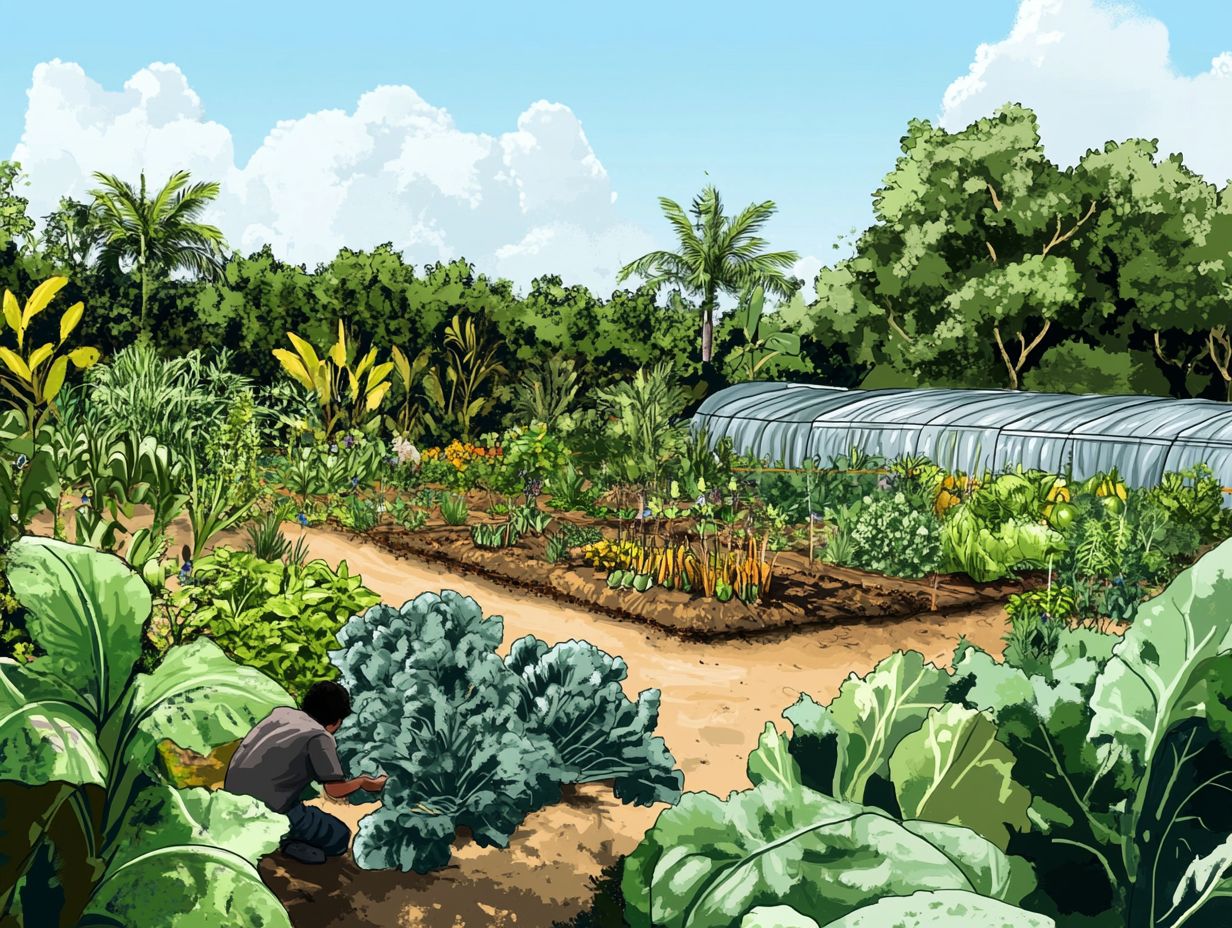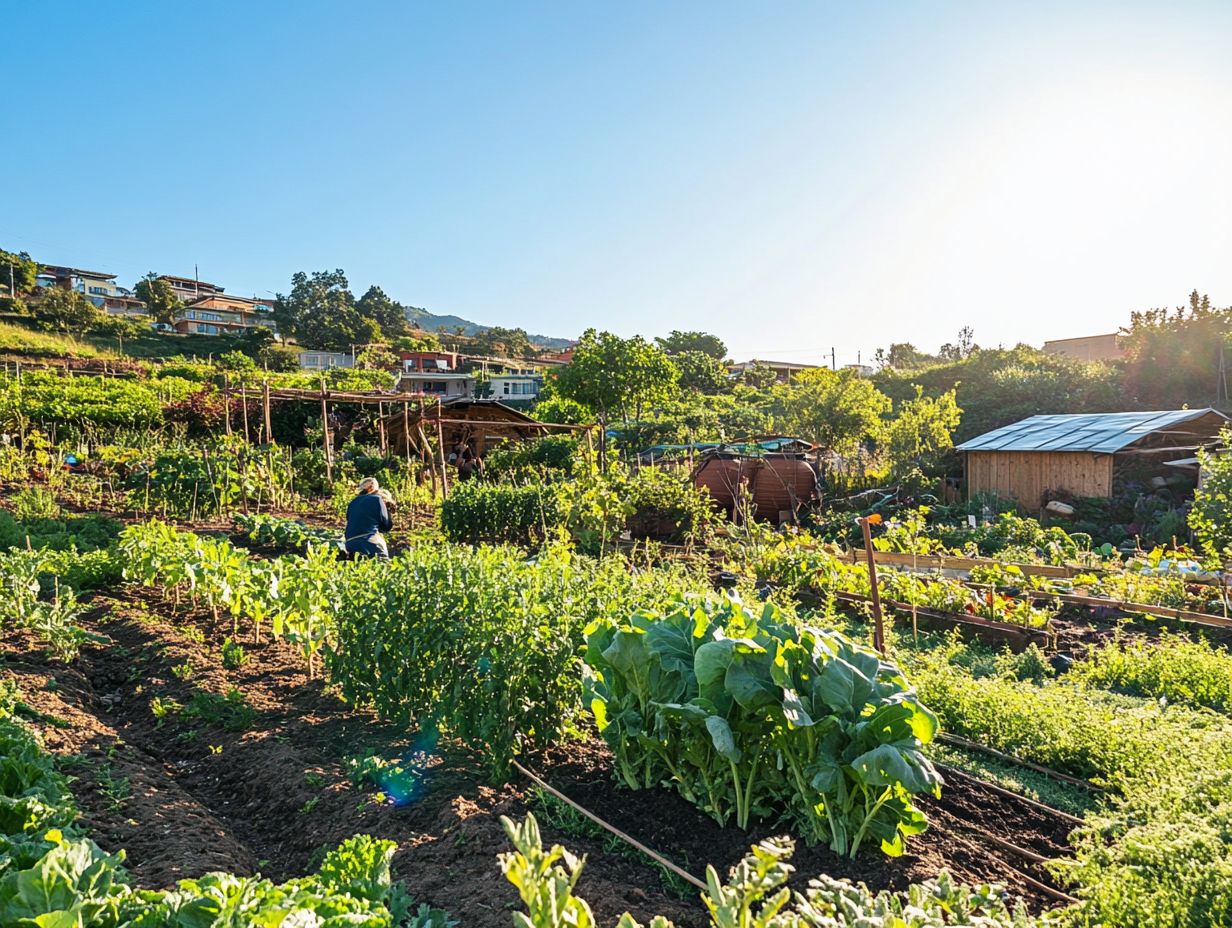Can Permaculture Help Combat Climate Change?
Permaculture offers a holistic approach to sustainable living, seamlessly weaving ecological principles with practical applications.
In this exploration, you will discover what permaculture entails and its core values. You will also learn how it can significantly contribute to the fight against climate change.
You ll encounter successful projects that exemplify its impact, while addressing common challenges and criticisms associated with it.
You will also receive practical tips to integrate these principles into your daily life. By embracing permaculture, you pave the way for a healthier planet and a more sustainable future.
Contents
- Key Takeaways:
- Understanding Permaculture
- Permaculture Principles
- The Role of Permaculture in Combating Climate Change
- Challenges and Limitations of Permaculture
- How to Incorporate Permaculture in Your Life
- Frequently Asked Questions
- Can Permaculture Help Combat Climate Change?
- How does permaculture help combat climate change?
- What are some specific ways that permaculture can combat climate change?
- Can permaculture be implemented on a large scale to make a significant impact on climate change?
- Are there any other benefits of permaculture besides combatting climate change?
- How can individuals contribute to using permaculture to combat climate change?
Key Takeaways:

- Permaculture is a sustainable and holistic approach to agriculture and land management that prioritizes working with nature rather than against it.
- By following permaculture principles and implementing practices such as agroforestry and soil regeneration, we can reduce our total amount of greenhouse gases we produce and mitigate the effects of climate change.
- While permaculture faces challenges and criticisms, incorporating its principles into our daily lives can make a positive impact on the environment and contribute to a more sustainable future.
Understanding Permaculture
Understanding permaculture principles is crucial for cultivating sustainable living practices that align seamlessly with our natural ecosystems. This approach boosts biodiversity and reduces your carbon footprint.
Developed by visionaries like Bill Mollison and David Holmgren, permaculture combines agricultural practices with ecological principles to forge resilient human systems. It champions organic farming, community agriculture, and resource sharing, nurturing positive relationships within local communities.
By implementing effective permaculture solutions, you can take an active role in promoting environmental justice while tackling pressing challenges like climate change and agricultural waste.
What is Permaculture?
Permaculture is a design philosophy that integrates land, resources, people, and the environment to craft sustainable and productive ecosystems.
This approach emphasizes nurturing beneficial relationships among all living organisms. It cultivates a harmonious balance essential for thriving ecosystems. In today s food industry, permaculture plays a pivotal role by championing organic agricultural practices that prioritize human health while enhancing soil fertility and biodiversity.
By harnessing natural processes and cycles, permaculture fosters ecological stability, presenting innovative solutions to challenges faced by conventional farming, such as soil degradation and dependency on synthetic fertilizers.
This holistic method invites communities to embrace regenerative practices, paving the way for sustainable food systems that benefit both people and the planet.
Permaculture Principles
Permaculture principles are essential guidelines to create sustainable solutions. They harmonize with the natural world and foster ecological practices.
Key Principles and Values
The key principles and values of permaculture highlight the significance of ecological practices and sustainable agriculture in fostering thriving communities. By prioritizing care for the Earth, you engage in regenerative methods that restore ecosystems and enhance biodiversity.
This commitment extends to caring for people, nurturing supportive relationships and building resilience within your community. The principle of fair sharing ensures that resources are distributed equitably, encouraging collaboration and cooperation among community members.
When you embrace these values, you cultivate not just food but also meaningful connections, pooling knowledge and resources with others. This collective spirit fosters an engaged community where everyone contributes to and benefits from sustainable practices, ultimately enriching the broader environment.
The Role of Permaculture in Combating Climate Change

Permaculture is a powerful tool in the fight against climate change. It employs practices that effectively reduce carbon footprints while boosting biodiversity through regenerative agriculture, including designing for climate resilience in permaculture.
By integrating these sustainable methods, you can make a difference by contributing to a healthier planet and fostering a more balanced ecosystem.
How Permaculture Can Help Mitigate Climate Change
Permaculture initiatives play a vital role in your climate adaptation efforts. They foster ecological balance and address challenges like methane production and nitrogen loss.
These holistic practices include water conservation techniques such as rainwater harvesting and greywater recycling. This ensures that you make the most of precious resources.
By developing various composting methods like vermicomposting, which uses worms to break down organic matter, and bokashi you enrich the soil, enhance nutrient cycling, and significantly cut down on organic waste that ends up in landfills.
Implementing community farming strategies encourages collaboration among neighbors. This paves the way for local food production while shrinking carbon footprints.
By embracing these sustainable approaches, you not only boost biodiversity but also cultivate resilience against climate change. Ultimately, you contribute to healthier ecosystems and communities.
Examples of Successful Permaculture Projects
Numerous successful permaculture projects around the world illustrate the immense potential of community engagement in sustainable agriculture and biodiversity enhancement.
Take, for example, Cuba’s urban gardening initiatives. They transformed empty lots into vibrant green spaces, allowing you and your neighbors to grow your own food while rejuvenating local ecosystems.
In the Pacific Northwest, Forest Gardens showcase the effectiveness of polyculture, where diverse plant species thrive together. This promotes soil health and attracts beneficial insects.
These efforts do more than just provide fresh produce; they cultivate a sense of community. This encourages collaboration among residents like yourself. Through these projects, local ecosystems flourish, emphasizing the powerful connection between sustainable practices and social cohesion.
Challenges and Limitations of Permaculture
Despite its numerous advantages, permaculture encounters various challenges and limitations. You must consider these to fully harness its potential in fostering ecological practices and enhancing human health.
Obstacles to Implementing Permaculture
Implementation obstacles such as agricultural waste, the prevalence of toxic chemicals, and pesticide toxicity will block your path to adopting permaculture practices.
These barriers disrupt the delicate ecological balance and pose serious health risks to both farmers and consumers. Agricultural waste frequently leads to soil degradation, making the land less fertile and diminishing its capacity to support diverse plant life.
The rampant use of toxic chemicals in conventional farming diminishes biodiversity, adversely affecting pollinators and other beneficial organisms essential for a thriving ecosystem. These pesticides contaminate local water sources, contributing to broader ecological and public health crises.
Thus, it becomes imperative for you to take action by exploring sustainable solutions that minimize or eliminate these hazardous substances, especially if you’re advocating for widespread permaculture adoption as a viable alternative.
Address these obstacles now to unlock permaculture’s true potential.
Addressing Criticisms and Concerns

Addressing criticism around permaculture is important. It fosters resilience and promotes environmental justice in agriculture.
You may encounter arguments suggesting that the principles of permaculture are not easily scalable. This raises questions about how small-scale methods can sufficiently meet the food demands of an ever-growing population. Some perceive its practicality as limited, citing a lack of technical precision and an over-reliance on local context, which can be intimidating for those unfamiliar with its concepts.
You can address these critiques through active community engagement and participatory approaches, where local stakeholders collaborate to adapt permaculture techniques to their specific environments.
By incorporating diverse perspectives and drawing on indigenous knowledge, you can demonstrate that permaculture is not only scalable but also practical. This paves the way for more inclusive and sustainable agricultural systems.
How to Incorporate Permaculture in Your Life
Incorporating permaculture into your life offers you a wealth of practical tips and strategies. These not only promote sustainable living but also deepen your connection with the environment.
By embracing these principles, you can cultivate a lifestyle that harmonizes with nature. This fosters both personal well-being and ecological health.
Practical Tips and Strategies
Practical tips for implementing permaculture practices revolve around prioritizing soil health, conserving water, and embracing regenerative agriculture techniques.
These foundational elements can profoundly enhance the sustainability of your home garden. Engaging in composting minimizes waste and enriches soil quality, giving your plants the power to flourish.
Exploring community farming opens up wonderful opportunities to collaborate with neighbors, share resources, and cultivate a diverse array of crops.
You can foster beneficial relationships with nature by planting native species. These attract pollinators and support local ecosystems.
By integrating these strategies, you can create a more resilient environment. This ensures a harmonious balance between your home and the natural world surrounding you.
Frequently Asked Questions
Can Permaculture Help Combat Climate Change?
Yes, permaculture is a sustainable farming and gardening practice that can significantly contribute to combating climate change, and understanding the impact of climate on permaculture gardening is crucial for its effectiveness.
How does permaculture help combat climate change?

Permaculture focuses on working with the natural environment to create sustainable food production systems. This has a positive impact on the health of the planet and can help reduce the effects of climate change.
What are some specific ways that permaculture can combat climate change?
Permaculture uses techniques such as agroforestry, which is the practice of growing trees alongside crops, water conservation, and soil management. These methods reduce carbon emissions and increase carbon sequestration, which are essential in mitigating climate change.
Can permaculture be implemented on a large scale to make a significant impact on climate change?
Yes, permaculture principles can be applied to large-scale agriculture and land management. This makes it a powerful tool in the fight against climate change.
Are there any other benefits of permaculture besides combatting climate change?
Absolutely, permaculture has numerous benefits, including promoting biodiversity, improving soil health, and providing a sustainable source of food and resources for local communities.
How can individuals contribute to using permaculture to combat climate change?
Individuals can learn about and implement permaculture practices in their own gardens or support local permaculture initiatives in their community. By supporting sustainable food production, individuals can make a positive impact in the fight against climate change.






